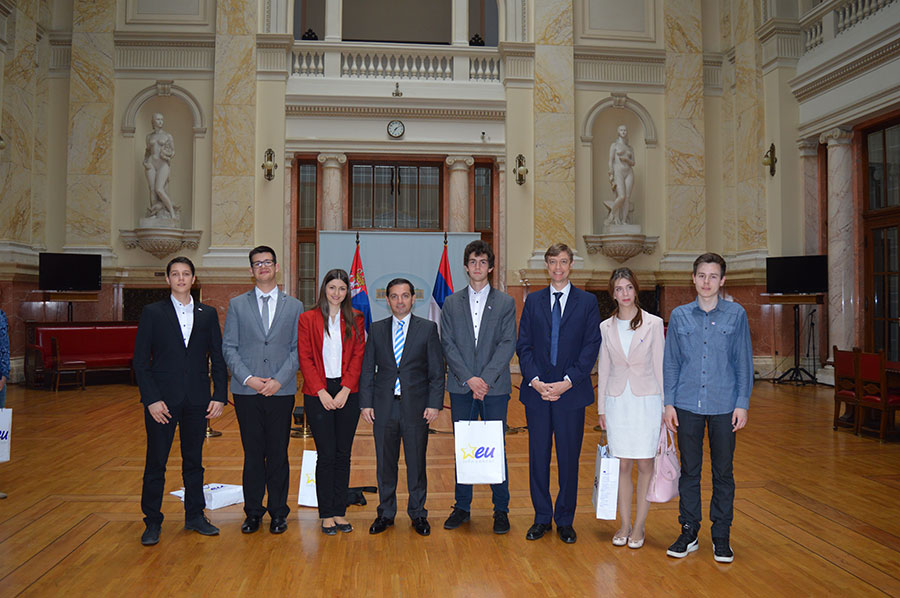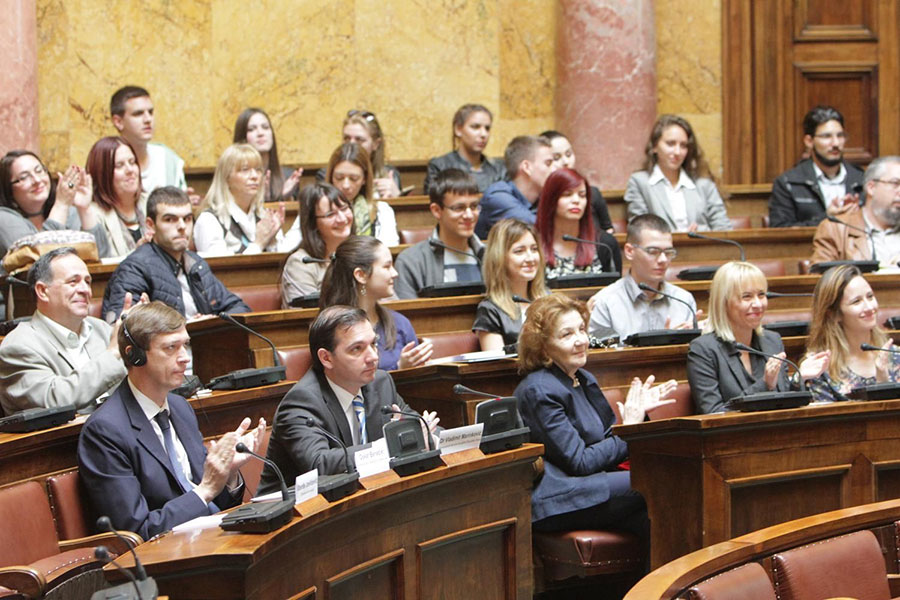Today, the EU Delegation to Serbia, EU Info Center and Open Communication organized the final debate of the European Debate School competition entitled “This House believes that the EU should extend the free movement of workers to the Western Balkan countries» in the National Assembly of Serbia.
This was the final event of the European Debate School competition which took place from November 2015 to May 2016. 165 participants applied for the competition, high school students from all over Serbia (Nis, Novi Sad, Kragujevac, Krusevac, Becej, Pecinci, Paracin, Jagodina). , Odzaci and Belgrade) of which 30 were selected to compete. Before the final round in Belgrade, debates took place in Novi Sad, Nis, Becej and Paracin.
The final debate, held at the National Assembly of Serbia, divided the participants into two teams of three members, while the jury consisted of the deputy head of the EU delegation to Serbia Oskar Benedikt, the vice-president of the National Assembly Vladimir Marinkovic and Djordje Jovicevic. open communication.
The aim of the project, carried out in Serbia for three consecutive years, is to arouse young people’s interest in debate, as an increasingly popular method for developing critical thinking. During the debate, participants were not supposed to express their own point of view, but to represent their team’s position as convincingly as possible.
“Migrants filling scarce jobs in European labor markets »
 The team advocating for Western Balkan countries to be included in the free movement of workers – Nadja Milosevic, Nikola Tucakov and Aleksandar Radivojevic – argued that European economies needed new labor and that workers from the region would adopt European standards even before their adoption. the country joined the EU.
The team advocating for Western Balkan countries to be included in the free movement of workers – Nadja Milosevic, Nikola Tucakov and Aleksandar Radivojevic – argued that European economies needed new labor and that workers from the region would adopt European standards even before their adoption. the country joined the EU.
Nadja Milosevic said that “labor migration is wrongly seen as responsible for rising unemployment, but the truth is that migrants often fill jobs that are scarce and in high demand in state labor markets members of the EU. »
Nikola Tucakov said such a measure could enable the development of trade ties and bring citizens closer to the EU single market. “Money is not the only motive. Family and cultural ties would prevent populations from resettling en masse. Current status quo This opens up the possibility of creating an underground labor market through which people try to find any job in the EU, which is bad not only for the workers themselves, but also for the rule of law. , said Tucakov.
Aleksandar Radivojevic said workers should be sent back to their countries if they fail to find a job within three months. “According to data from the Diaspora Cooperation Office, 4 billion euros enter Serbia every year in the form of money that people who work abroad send to their families in Serbia. In this way, we strengthen the purchasing power of citizens and promote production, which further strengthens the economy of our country,” said Radivojevic.
“Even more people would leave the country and lose their motivation to join the EU”

FoNet
The opposition team, consisting of Ana Vesic, Nikola Stankovic and Uros Pajcin, argued that the inclusion of the Western Balkans in the free movement of workers would cause a brain drain in Serbia. Team, however, argued that people should be encouraged to stay in their countries, noting that EU workers do not view workers from the Balkans with sympathy due to their overall negative attitude towards migrants and the belief that migrants take away their jobs and reduce their living costs. work.
Ana Vesic said EU citizens believed that the accumulation of work was driving down their wages. “European citizens are afraid of having to accept lower wages, even if this perception differs from reality,” said Ana Vesic.
Nikola Stankovic said that trade links already existed and that claiming that our citizens did not know the European market was wrong, because our trade relations with the Union were already well developed. “More than 30,000 people leave Serbia as it is every year; if such a measure were implemented, more people would leave the country. Furthermore, people will lose interest in the EU because the EU would have cheaper labor, while the candidate countries would be left with an insufficient number of experts and workers,” Stankovic said. .
Uros Pajcin argued that the inclusion of Western Balkan countries in the free movement of workers “would reduce the number of quality workers and, in particular, the critical mass necessary to control the work of politicians in carrying out their daily work.
“The free movement of workers is also a controversial subject in the EU”
The debate in the Small Hall of the National Assembly brought together 150 high school students from Nis, Paracin, Belgrade, Pancevo and Becej.
The opposition team won the debate thanks to votes from the public and two jury members, Djordje Jovicevic and Vladimir Marinkovic, who believed that the possibility of finding a job in the EU would come in time, but did not was not necessary at the moment. given that Serbia loses 30,000 people per year. In the coming period, Serbia will increasingly need a workforce capable of moving the economy forward and implementing reforms on the path to the EU.
Jury member Oskar Benedikt voted in favor of the free movement of workers, although he stressed that Brussels saw the brain drain as key because it reduced national potential and added that the issue was also controversial within of the EU and was a trigger for the United Kingdom. referendum.

